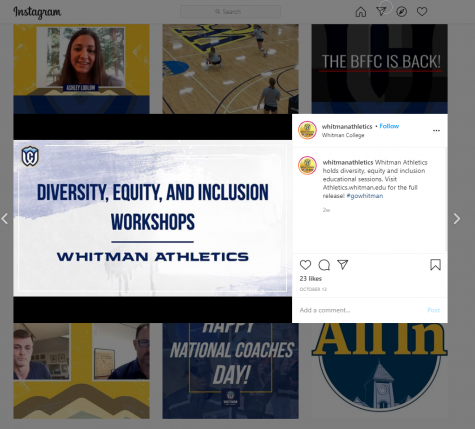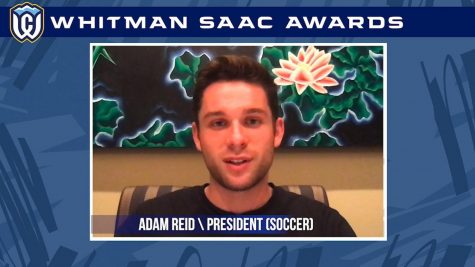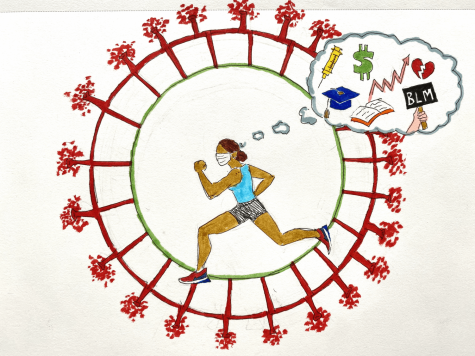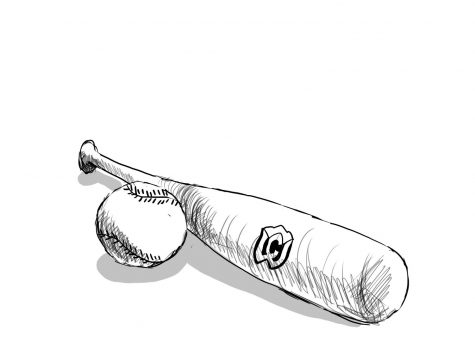“Trust in the process”: Student-athletes push for DEIA training
May 5, 2022
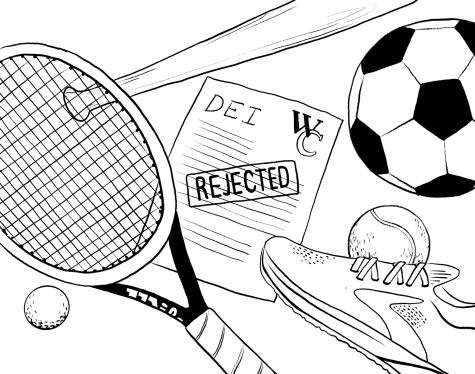
Reid Ballroom was packed with varsity student-athletes from every sport. All of their eyes trained on junior tennis player Angel Le, standing behind the podium at the front of the room.
Le was presenting as part of Whitman’s annual Power & Privilege symposium. Her talk, titled “Sports Empowering Diversity and Inclusion: Process vs. Progress in College Athletics,” was coming to a close.
“I ask you all to listen to your student-athletes’ voices, especially the Black, Indigenous student-athletes of color’s voices, because we deserve to be heard,” Le said. “Put trust in the process, and start investing in the progress. Thank you.”
Resounding applause followed.
Le had just spent the past half hour describing “the process,” a two year-long saga of Whitman student-athletes calling for the athletic department to make changes related to Diversity, Equity, Inclusion and Accessibility (DEIA).
Following the Black Lives Matter protests in the summer of 2020, a group of Whitman student-athletes, with the help of alumni, proposed a list of actions aimed to help Whitman athletics address DEIA-related issues. Key among these actions was the formation of a DEIA training program, designed to educate student-athletes on issues such as anti-racism and cultural competency.
The movement to implement such a program gradually gained momentum. Student-athletes from multiple sports banded together in an effort to make the vision into a reality, realizing the importance of DEIA education, especially at a predominantly white institution like Whitman.
Le was part of this initial group.
“It’s always a necessity to have [DEIA] training for student-athletes, especially on a college campus,” Le said. “It should have been in place to begin with.”
A series of posts on the Whitman Athletics Instagram also served as a catalyst for the movement. Ostensibly intended to express support for the BLM movement, many student-athletes viewed the posts as performative and saw them as evidence that DEIA education was needed throughout the athletics community.
On June 19, 2020, @whitmanathletics posted a simple graphic. WE CELEBRATE AND RECOGNIZE JUNETEENTH, the image announced. The caption was scant, simply tagging a few athletic governing organizations. Whitties were unimpressed.
“Someone had time to make this graphic but not to type up a paragraph about the department’s role in perpetuating racism?” one comment read. “When is Whitman Athletics going to release a statement about the racial injustice that happens on our campus? How about you outline the actionable steps it will take to rectify the injustices directed toward the BIPOC athletes and athletic staff at Whitman?”
After overwhelming nonresponse from department leadership, the Student-Athlete Advisory Committee (SAAC) took matters into their own hands. SAAC, the main student-athlete leadership body, began by creating a survey to gauge student attitudes towards the department’s DEIA policies.
For Adam Reid, then-president of SAAC, this was an opportunity for the committee to fulfill its intended purpose: representing student-athletes and advocating for their needs.
“I felt it was our duty to represent the [student-athlete] voice, because what it was telling me was that they’d had bad experiences and wanted some change, and wanted [DEIA] training,” Reid said.
Reid made sure to take every step he could to ensure the quality of survey, even enlisting outside help from faculty with DEIA and sociology expertise. As student-athletes’ responses trickled in, the results became clear.
“The findings indicated to us that there was a majority of student-athletes who would like to see the department do a better job in the sphere of Diversity, Equity and Inclusion, specifically in training for student-athletes,” Reid said. “At least that’s what the data indicated to us.”
In particular, the survey found that athletes were disappointed with the department’s tendency to pursue performative action and that they felt they were stifled when they asked for real changes to be made. Respondents also noted that they felt the department didn’t hold members of the community accountable for racist remarks and/or actions. This led many to identify DEIA training as a way to deal with these issues.
Following the conclusion of the survey, SAAC outlined a structure and curriculum for a training program called Athletes for Cultural Competency Training (ACCT). ACCT as a way to educate student-athletes on issues such as anti-racism and cultural competency in a peer-to-peer format.
The athletics department did not take up the ACCT proposal.
According to Kim Chandler, the college’s Director of Athletics, this was mainly due to a need to find a non-mandatory solution that works for all members of the Whitman athletics community. She also emphasized the need for guidance behind any potential trainings.
“The peer-to-peer training is significant. I think it can be really beneficial, but the question we had was who is going to train the students. So that when students do train other students that there is a legitimacy to it and a common message,” Chandler said.
In this vein, she proposed a task force of athletes and staff be created to determine how the department should proceed. Unfortunately, the department was unable to secure the funding necessary to get the project off the ground last school year.
However, funding for the task force was finally approved last month, and it convened for the first time shortly thereafter. The force’s stated goal is to “discuss the area of needs for our athletic community and to envision what our DEIA initiatives, strategies and best practices for student-athletes, teams, coaches, and staff should look like and consist of for the 2022-2023 academic year.” Furthermore, the project has a set timeline, aiming to have all of its work completed by September of next year.
Chandler is all in on the task force.
“I think there are a lot of ways to look in the rearview mirror, but for me right now I couldn’t be more excited about the funding and the launching of the task force,” Chandler said. “The main goal [of the force] is to have a determination by August about what this [DEIA] training and programming will look like for 2022-2023.”
Le is cautiously optimistic. She’s glad that the task force has become a reality, but fears that concrete change might still be avoided. She recognizes that the task force is progress, but worries that it will fit into a previously established pattern of all talk and no action.
“There is just so much talking going on,” Le said. “We don’t need to keep talking about what to implement, because the group of student-athletes who worked together over the summer of 2020 already developed what we want. And so, for them to continuously ask, what do you guys want? Well, clearly you guys aren’t listening or you do hear us, but you’re not wanting to do what we want. Even though you know that what we want is what we should be doing.”
Emma Anderson, a senior volleyball player, has been involved in the push to make DEIA related changes in the department since its initial moments. She is now a member of the task force and expressed a similar sentiment to Le when describing how their first meeting went.
“It was very brief. We pretty much just introduced ourselves and then talked about what we would want in this type of program. For me that was a question asked and answered in 2020,” Anderson said.
Anderson, Le and Reid all attest to the fact that student-athletes have made it clear what they need and have outlined exactly how the department might go about addressing said needs. Yet, there hasn’t been any concrete action in the direction of meeting those needs.
The department has its reasons for the slow progress and the task force is promising. However, the voices of athletes, past and present, need to be listened to in the process going forwards. It’s time to put words into action and build on the work that has already been done—or, in Le’s words, put trust in the process and start investing in progress.





